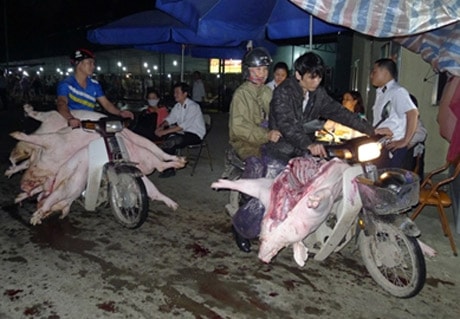Unsanitary meat and contaminated with banned substances
While the majority of people still have to eat meat slaughtered from unsanitary facilities, the control of banned substances (beta agonis group) in livestock farming still has many worrying loopholes.

Preventing dirty meat - mission impossible. Photo: Pham Anh.
Meat, intestines, and slimy by-products on the floor
According to statistics from the authorities, in Hanoi there are about 3,000 small-scale slaughterhouses and points that "poke to death, shave hair" on dirty floors. Most of the above slaughterhouses are located in residential areas, even slaughtering at households, without implementing the process of thorough quarantine; checking and controlling slaughter according to regulations.
Hanoi used to have 7 slaughterhouses for livestock and poultry with modern production lines, but now only 2 are operating (capacity only reaches 10-20%). Thus, it can be understood that the majority of people in the capital are consuming meat from manual slaughterhouses (most of which do not ensure food safety and hygiene).
According to Mr. Nguyen Dinh Dang - Deputy Head of Hanoi Veterinary Department, most of the above facilities and slaughterhouses are not included in the construction planning of the authorities at all levels; the slaughterhouse area, tools, water, waste, environment... do not meet the standards of a slaughterhouse as prescribed.
According to information from the Hanoi Veterinary Department, right at the centralized slaughterhouse in Van Phuc (Thanh Tri, Hanoi), where about 1,200 pigs are slaughtered per day and managed by Thinh An Joint Stock Company, there is still a situation of slaughtering, preliminary processing of intestines and by-products on the brick floor, slimy with blood and hair. After the slaughter, the traders carry 2-3 naked pigs, even 4-5 on each motorbike, running all over the roads to the markets.
According to Mr. Nguyen Nhu Tiep - Director of the Department of Agriculture, Forestry and Fisheries Quality Management, through the assessment of livestock and poultry slaughterhouses (from 31 provinces and cities), the rate of facilities classified as C (not meeting standards) for the first time is still high (nearly 45%).
As for the periodic inspections, 60% of them were classified as C and re-inspected (180 establishments), 52 establishments were upgraded to B (28.9%), the remaining 128 establishments were still classified as C (71%). Currently, these establishments are temporarily suspended until the inspection results meet the requirements before they can operate again. According to Mr. Tiep, the public disclosure of establishments classified as C and the re-inspection of establishments classified as C have not been widely implemented, the periodic inspections are still very slow and not complete according to regulations.
Mr. Tiep said that the recent food safety inspection in 9 provinces and cities showed that, out of 25 collective kitchens, supermarkets and agricultural processing facilities, 17 facilities have not yet fully met food safety requirements. The main reasons are lack of labor protection, stagnant water on the floor, shared toilets in warehouses, raw materials stored on the floor, use of meat without quarantine stamps, unclear records, and raw materials of unknown origin.
Difficult to manage toxic substances
Recently, the Department of Agriculture and Rural Development of Dong Nai (where farmers were found to be using banned substances to help pigs "grow their thighs" and "grow their shoulders" in 2012) announced that through analyzing 50 urine samples and 50 animal feed samples on the market, they did not detect any banned substances that create lean meat in the beta agonist group (Ractopamine, Sabultamol, Clenbuterol). However, due to the lack of assurance in the slaughtering, transportation, and sale stages at the market, the meat on the shelves was contaminated with many microorganisms, which is very worrying.
Mr. Le Ba Lich - Chairman of the Vietnam Animal Feed Association said that controlling the quality of meat containing residual antibiotics and toxic substances is currently very difficult. According to him, Vietnam has almost not produced additives and supplements in animal feed, helping livestock and poultry gain weight quickly, so it has to be imported. Currently, the whole country has nearly 200 enterprises importing the above additives and supplements (many from China) and all do not go through the association. And it is very difficult for the authorities to manage this step.
According to Mr. Lich, these supplements are very expensive, from tens to hundreds of millions of VND/kg, the dosage is only 0.5-1 kg of additives/ton of animal feed. "Whether there is a group of banned beta agonists in animal husbandry or not also comes from this" - Mr. Lich said.
Mr. Lich said that large animal feed manufacturers are not foolish enough to add banned substances, because if discovered, they will "go out of business". Mainly, small companies import through unofficial channels and market banned substances to livestock farms. Currently, the situation of slaughtering pigs for sale but the amount of antibiotics and supplements that have not been "consumed" is still common.
Hanoi Veterinary Department said that in the first 7 months of this year, Hanoi authorities handled 670 violations in the transportation and trading of poultry and animal products (mainly food of unknown origin, not ensuring food safety). Of which, nearly 300 million VND was fined, more than 27 tons of feathered chickens were confiscated and destroyed, and 34 tons of fresh poultry products, frozen chickens, 29 tons of animal products (intestines, brains, feet, claws, etc.) |
According to Dan Tri - HV






